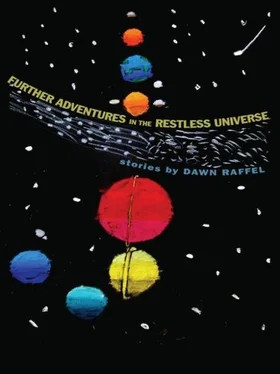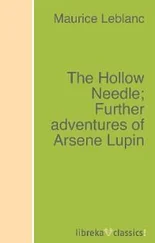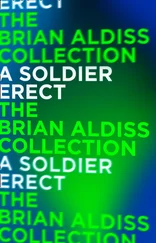“It is?” he says.
“Yes,” she says. “A mean one at that.”

He proves her right.
“Can’t sleep,” he says.
“I know,” she says. “Your father also never slept.”
“My dad?” he says.
She ought to do something maternal, she knows. Tell him a story. “My mother would tell me a story,” she says. “I just can’t think.”
“You said my dad.”
“I did,” she says.
“Tell me something else,” he says.
“Like what?” she says.
“Something.”

There’s a crack in the glass in the morning; Faye sees it. “Look at the window,” she says. “It’s shot.”
“Shot?” he says.
“Cracked,” she says.
“How did it happen? Was it a bad guy?”
“No,” she says. “I doubt it.”
“I’ll cut him,” he says.
“It wasn’t a bad guy.”
“Who?” he says, “Who did it, then?”
“For certain,” she says, “it was only the weather, or maybe a prank, or else the pane was unstable.”
“Or maybe,” the boy says, “it might have been a cur.”

The boy knows better. Of course he does. He will not rest. “Maman,” he says. “You promised a story.”
“Tomorrow,” she says.
He says, “You said that yesterday. A promise is a promise. You said it yourself.”
“You’re right,” she says. And she will not tell the boy about promises broken, the hair of the ghost. “Once upon a time,” she says. “There once was a mother who loved her little boy…”
“Mom,” he says. “A story. A real one.”
“Stop it,” he says.
“Get off me,” he says.
“I can’t,” she says.
“Mom!”
“On the night you were born, there was a fire in the hospital.”
“Really?” he says.
“Really,” she says.
“Cool,” he says.
“They sounded the alarm. Everyone evacuated, even the babies.”
“Me?” he says.
“You,” she says. “At least it was nice out.” His father was there. It was he who’d cut the cord, had held the bloody scissors. “I thought it was a sign,” she says.
“Of what?” he says.
“I really couldn’t tell you.”
“What happened?” he says.
“The fire,” he says.
It had to mean something, is what she had thought. “What else?” she says. “They put it out.”
My mother called to tell me that today was her birthday.
“I didn’t think,” I said, “that you would be alive.”
She wasn’t, of course. In the morning I went to the pool where I go when I go to swim laps. The pool is high up and has a view of the city. After I swam, I went to see a movie. I could not go to work because a steam pipe had broken — exploded — outside the building, the high rise, that has my office in it. A violent plume had obstructed the sky, ruddy and thick, and there were shards flying everywhere, of masonry and glass. People were screaming, believing the worst.
I wished just a little that I had been there.
It was all of it cordoned: papers, files, information irretrievable, the windows blown. The news showed the street, laid bare save for rubble.
Outside the theatre, the rain fell hard. The roof had a leak. Drops, great drops, then showers of water poured onto the plastic — hefty, black — that someone had laid on the topmost seats. I had just come from a country, from visiting a country, where things like this happened. Water that fell rolled all down the floor. The handful of people watching the movie in the middle of the day in a city where things such as this were not prone to happen did not appear troubled. They moved to dry chairs. The star of the movie, a world-famous actress was dying and dying, and then she died.
I went home and baked treats to mail off to my sons via overnight service, throwing away all the ones I had burnt. There were many I had burnt.
I called my office voice mail.
My sister was not home. I left her a message, which might or might not have recorded, I thought.
My mother had called me the night before the morning she did not wake up. She was coming to see me, had purchased a ticket, would be here, she said. She said, “I have to get away.” She said, “Out of this place.” She wanted to talk about food we would eat, in the future, in the city. Bread from the bakery, Chinese, cake. She said, “I must.” (“Must you go?” my great aunt said before she died.) My mother, I thought, did not sound distraught. But I have not told the truth. I didn’t, in fact, speak to my mother on the night before the morning she did not wake up. I am off by a day, a week at most.
The call came at work. I was not at my desk. This did not matter. I said they were wrong. My stepfather lay dying himself on his side of the bed, and he was quite hard of hearing. The housekeeper found her.
The telephone, the catering, the burial, bills. The carpeting, the realtor asserted, had to go. It was I who placed the papers and tissues into the bag — it was a big, dark bag — and then I wiped the surfaces. The carpet was cream. It was all done correctly.
The corporate hotline did not have an update.
The boys sent a message from somebody’s gadget in digits and type.
I cleaned up the kitchen. The call was my sister. I said, “What’s new?”
“It’s raining,” she said.
“Here, too,” I said, “and I am so far away.”
MIGHTY BREAKERS OF THE SEA
All along the waterfront, the girls fan out. Look at them there! In red and in blue, in yellow, white. They are young, there! In red and in blue, in yellow, white. They are young, these girls; they are dressed in swaths of gauze. They are walking in the water.
The moment should be frozen. The story we are witnessing should have had a different start, such as, Once upon a time, or, In another country.
The water rises. The girls are subsumed — to the breast, the neck.
It is a very old tale.
The girl in yellow appears to be looking for something under the surface she will not find, or must not find. The other girls take her and lead her ashore.

“If,” says the king of the kingdom to girl in the yellow. “If you find the feather, you may marry the prince.” He says, “The feather is enchanted and will carry good fortune.” The boy will be king regardless of outcome. The mothers are absent, as it must happen. The feather, according to the king, will be in water. “Come,” the king says to the girl in yellow. “Do you not wish to be the wife and then the mother of a prince and then a king?”
He had buried his previous wife alive in ice, the prince had, for a minor infraction — a wayward glance, not even a kiss. The wife before that, a child, no less, not much past twelve, was believed to have been poisoned with a drop on the tongue.
The king takes the girl in yellow by the shoulder. Old as he is, he has all of his teeth. “Will you not look for the feather?” he says.
“But where?” she says.
“In the morning,” he says, and shuts the girl in yellow in a room in which the window is broken.
Day break, a bird flies in through the frame. “I will help,” the bird says. “If you will give me your pledge.”
“What pledge?” says the girl. “And what if I don’t?”
“Then you’ll die,” the bird says.
And so the girl clambers out through the window and follows the bird, at least as well as she can, because the bird is swift. “What have I promised?” the girl asks the bird.
Читать дальше












